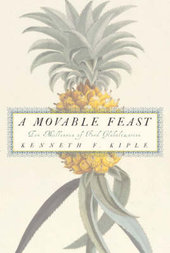
|
A Movable Feast: Ten Millennia of Food Globalization
Hardback
Main Details
| Title |
A Movable Feast: Ten Millennia of Food Globalization
|
| Authors and Contributors |
By (author) Kenneth F. Kiple
|
| Physical Properties |
| Format:Hardback | | Pages:386 | | Dimensions(mm): Height 229,Width 152 |
|
| Category/Genre | World history
Cookery, food and drink |
|---|
| ISBN/Barcode |
9780521793537
|
| Classifications | Dewey:641.3 |
|---|
| Audience | | Professional & Vocational | | Tertiary Education (US: College) | |
|---|
| Illustrations |
Worked examples or Exercises
|
|
Publishing Details |
| Publisher |
Cambridge University Press
|
| Imprint |
Cambridge University Press
|
| Publication Date |
30 April 2007 |
| Publication Country |
United Kingdom
|
Description
Pepper was once worth its weight in gold. Onions have been used to cure everything from sore throats to foot fungus. White bread was once considered too nutritious. From hunting water buffalo to farming salmon, A Movable Feast chronicles the globalization of food over the past ten thousand years. This engaging history follows the path that food has taken throughout history and the ways in which humans have altered its course. Beginning with the days of hunter-gatherers and extending to the present world of genetically modified chickens, Kenneth F. Kiple details the far-reaching adventure of food. He investigates food's global impact, from the Irish potato famine to the birth of McDonald's. Combining fascinating facts with historical evidence, this is a sweeping narrative of food's place in the world. Looking closely at geographic, cultural and scientific factors, this book reveals how what we eat has transformed over the years from fuel to art.
Author Biography
Kiple was born on January 29, 1939. His father was in the Royal Air Force which meant much moving during and after the war. He did his undergraduate work at the University of South Florida, and earned a PhD in Latin American History and a PhD certificate in Latin American Studies at the University of Florida. He has taught at Bowling Green since 1970 and became a Distinguished University Professor in 1994. His research interests have included biological history applied to slave trade and slavery, the history of disease, and more recently, food and nutrition. He is the author of approximately 50 articles and chapters, three monographs, and the editor of five edited volumes including the Cambridge World History of Disease, and (with K.C. Ornelas) The Cambridge World History of Food, in two volumes. He has been a Guggenheim Fellow, and received other grants from the National Institutes of Health, the National Library of Medicine, the National Endowments for the Humanities, Tools Division, and two HEH Fellowships, the Earhart Foundation. the Milbank Memorial Fund, the American Council of Learned Societies, the Rockefeller Archives, the American Philosophical Society, The Social Sciences Research Council and Fulbright-Hays.
Reviews'... brimming with curious titbits: the use of cocoa beans as currency; the accidental domestication of rye, oats and various legumes after they hitched a ride with wheat and barley; Coca-Cola's origins as a health tonic. Anyone interested in the history of food for whom The Cambridge World History of Food seems too large a helping will find Mr Kiple's sprightly summary volume far more palatable.' The Economist
|